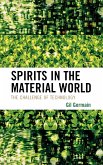In this book, McMahon argues that a reading of Kant's body of work in the light of a pragmatist theory of meaning and language (which arguably is a Kantian legacy) leads one to put community reception ahead of individual reception in the order of aesthetic relations. A core premise of the book is that neo-pragmatism draws attention to an otherwise overlooked aspect of Kant's "Critique of Aesthetic Judgment," and this is the conception of community which it sets forth. While offering an interpretation of Kant's aesthetic theory, the book focuses on the implications of Kant's third critique for contemporary art. McMahon draws upon Kant and his legacy in pragmatist theories of meaning and language to argue that aesthetic judgment is a version of moral judgment: a way to cultivate attitudes conducive to community, which plays a pivotal role in the evolution of language, meaning, and knowledge.
Hinweis: Dieser Artikel kann nur an eine deutsche Lieferadresse ausgeliefert werden.
Hinweis: Dieser Artikel kann nur an eine deutsche Lieferadresse ausgeliefert werden.








